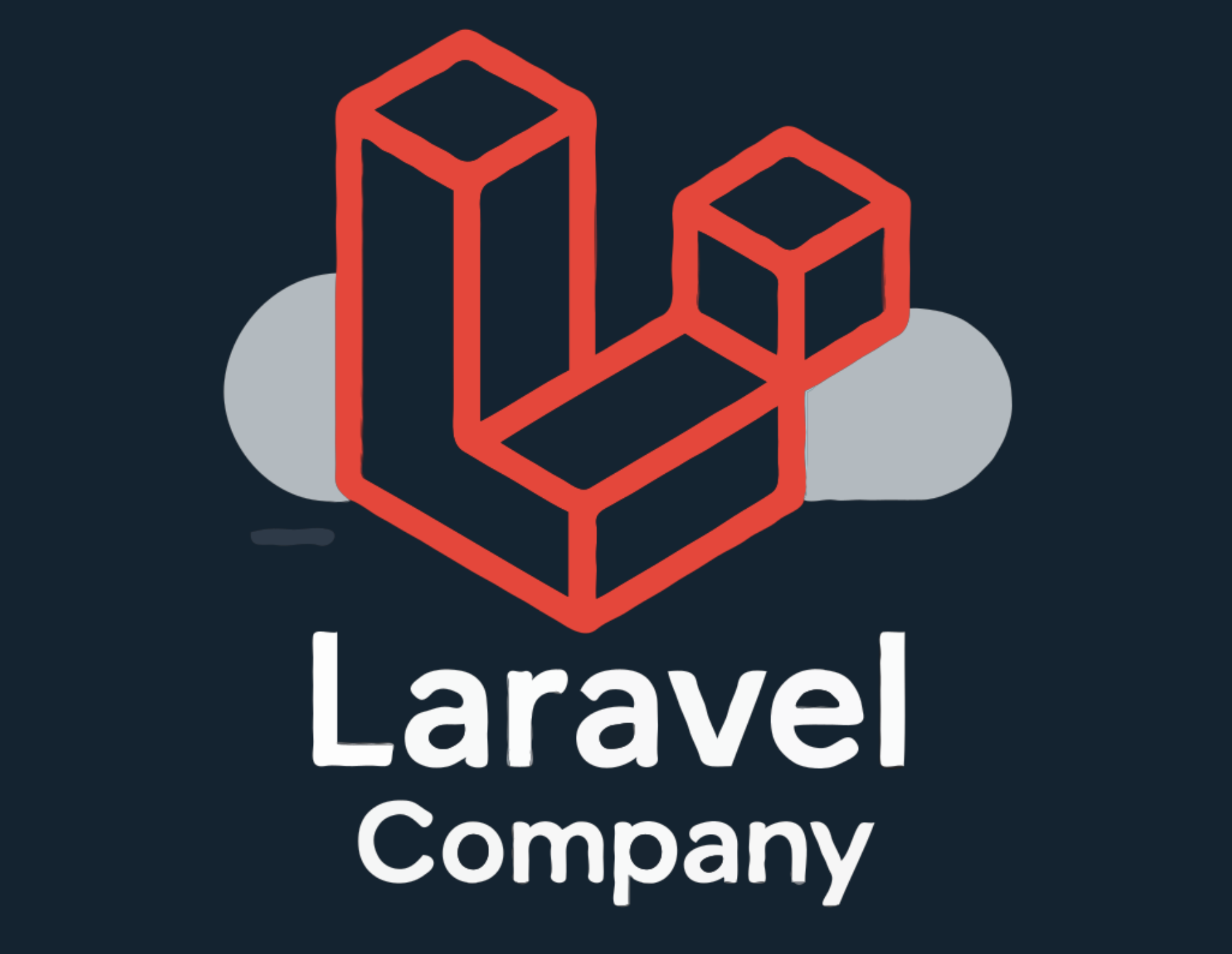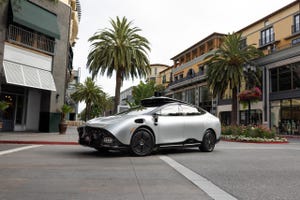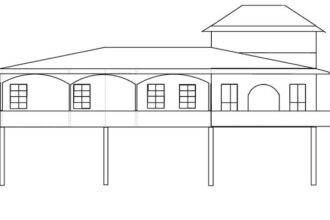Table of Contents
* AI Company Tensor Debuts a Robocar You Can Own
Robotaxis are expanding into a growing number of cities, but an AI company called Tensor unveiled a self-driving vehicle on Wednesday designed specifically for personal ownership.
The Tensor Robocar looks somewhat like a mashup of Waymo’s Jaguar I-Pace vehicles and Tesla’s Model Y, with sleek, futuristic contours and a silver finish, as seen in a promotional video. In a statement, the company said the vehicle has “over 100 seamlessly integrated sensors,” as well as 37 cameras, five lidars, 11 radars, 22 microphones and 10 ultrasonic sensors.
Tensor says the vehicle is Level 4 autonomous, meaning it can fully drive itself within a specified area and under certain weather conditions; robotaxis like Waymo are also Level 4.
“The Tensor Robocar is the first volume-produced, consumer-ready autonomous vehicle — designed from the ground up for private ownership at scale,” the company said in a statement. “While today’s autonomous vehicles are primarily built as RoboTaxis — heavily maintained, depot-dependent fleets — Tensor represents a radical departure: a truly independent personal Robocar engineered to serve its owner, not its operator.”
Tensor says its Robocar will be available “in select global markets” in the US, Europe and the United Arab Emirates, and deliveries will begin in the second half of 2026. The company did not reveal a price, however.
The company notes this new vehicle is “designed to meet the world’s most stringent automotive standards.” That includes the US National Highway Traffic Safety Administration’s Federal Motor Vehicle Safety Standards, which is designed to ensure vehicles and components like brakes, tires and airbags meet necessary safety requirements. Previously known as AutoX, it’s been certified for autonomous testing by the California DMV since 2020.
The Robocar is designed to serve as an agentic vehicle. You can state commands whether you’re inside the car or nearby, Tensor says. The promotional vehicle shows a woman using her phone to say, “Pick me up,” and, “Come now,” while specifying the pickup point on a map, adding, “Turn on the AC,” while walking to meet the vehicle. After exiting, she states commands like, “Open trunk,” and, “Go find a parking spot.”
What’s perhaps most interesting is that users can still drive the vehicle if they choose to do so. The video shows the woman climbing into the driver’s seat and tapping a button that makes a dashboard touchscreen slide away and reveal a steering wheel.
![]()**Watch this:** This Robotaxi Looks and Drives Like No Car You’ve Ever Seen Before
11:09
Tensor says personal information including a user’s location, preferences and records is “processed and stored locally on the vehicle, ensuring security.” Users can access their data through an end-to-end encrypted smartphone app or the onboard interface, the company adds. And if all the cameras and microphones make you uneasy, Tensor says there are physical camera covers and microphone off switches for more privacy.
A vehicle like the Tensor Robocar may be appealing to someone who still wants to own a personal vehicle while tapping into autonomous driving technology. Elon Musk has a similar plan for Tesla’s Robotaxi, which he said people can personally own while also having them operate as part of a ride hailing service. That vehicle, which was unveiled last year, is slated to go into production “before 2027,” according to Musk.
But developing self-driving technology is difficult, and shipping a vehicle like the Tensor Robocar by next year may be a lofty goal. Even if the vehicle is ready for delivery then, it’ll likely face the many regulatory hurdles even well-established self-driving companies have to navigate, as well as the high costs and technical challenges that tend to accompany such advanced systems.
Other companies big and small are getting in on self-driving vehicles. Waymo, which is owned by Google’s parent company Alphabet, is undoubtedly the leader, with a robotaxi presence in a handful of US cities and more to come — some via a partnership with Uber. Other companies like May Mobility and Nuro are also teaming up with Uber to make their services available to more people. Lyft similarly has a batch of ridehailing partnerships. And Zoox, owned by Amazon, is gearing up to launch commercially later this year.
Table of Contents AI Company Tensor Debuts a Robocar You Can OwnRobotaxis are expanding into a growing number of cities, but an AI company called Tensor unveiled a self-driving vehicle on Wednesday designed specifically for personal ownership.
“The Tensor Robocar is the first volume-produced, consumer-ready autonomous vehicle — designed from the ground up for private ownership at scale,” the company said in a statement.
“While today’s autonomous vehicles are primarily built as RoboTaxis — heavily maintained, depot-dependent fleets — Tensor represents a radical departure: a truly independent personal Robocar engineered to serve its owner, not its operator.”
A vehicle like the Tensor Robocar may be appealing to someone who still wants to own a personal vehicle while tapping into autonomous driving technology.
But developing self-driving technology is difficult, and shipping a vehicle like the Tensor Robocar by next year may be a lofty goal.
Table of Contents
Robotaxis are expanding into a growing number of cities, but an AI company called Tensor unveiled a self-driving vehicle on Wednesday designed specifically for personal ownership.
The Tensor Robocar looks somewhat like a mashup of Waymo’s Jaguar I-Pace vehicles and Tesla’s Model Y, with sleek, futuristic contours and a silver finish, as seen in a promotional video. In a statement, the company said the vehicle has “over 100 seamlessly integrated sensors,” as well as 37 cameras, five lidars, 11 radars, 22 microphones and 10 ultrasonic sensors.
Tensor says the vehicle is Level 4 autonomous, meaning it can fully drive itself within a specified area and under certain weather conditions; robotaxis like Waymo are also Level 4.
“The Tensor Robocar is the first volume-produced, consumer-ready autonomous vehicle — designed from the ground up for private ownership at scale,” the company said in a statement. “While today’s autonomous vehicles are primarily built as RoboTaxis — heavily maintained, depot-dependent fleets — Tensor represents a radical departure: a truly independent personal Robocar engineered to serve its owner, not its operator.”
Tensor says its Robocar will be available “in select global markets” in the US, Europe and the United Arab Emirates, and deliveries will begin in the second half of 2026. The company did not reveal a price, however.
The company notes this new vehicle is “designed to meet the world’s most stringent automotive standards.” That includes the US National Highway Traffic Safety Administration’s Federal Motor Vehicle Safety Standards, which is designed to ensure vehicles and components like brakes, tires and airbags meet necessary safety requirements. Previously known as AutoX, it’s been certified for autonomous testing by the California DMV since 2020.
The Robocar is designed to serve as an agentic vehicle. You can state commands whether you’re inside the car or nearby, Tensor says. The promotional vehicle shows a woman using her phone to say, “Pick me up,” and, “Come now,” while specifying the pickup point on a map, adding, “Turn on the AC,” while walking to meet the vehicle. After exiting, she states commands like, “Open trunk,” and, “Go find a parking spot.”
What’s perhaps most interesting is that users can still drive the vehicle if they choose to do so. The video shows the woman climbing into the driver’s seat and tapping a button that makes a dashboard touchscreen slide away and reveal a steering wheel.
Watch this: This Robotaxi Looks and Drives Like No Car You’ve Ever Seen Before
11:09
Tensor says personal information including a user’s location, preferences and records is “processed and stored locally on the vehicle, ensuring security.” Users can access their data through an end-to-end encrypted smartphone app or the onboard interface, the company adds. And if all the cameras and microphones make you uneasy, Tensor says there are physical camera covers and microphone off switches for more privacy.
A vehicle like the Tensor Robocar may be appealing to someone who still wants to own a personal vehicle while tapping into autonomous driving technology. Elon Musk has a similar plan for Tesla’s Robotaxi, which he said people can personally own while also having them operate as part of a ride hailing service. That vehicle, which was unveiled last year, is slated to go into production “before 2027,” according to Musk.
But developing self-driving technology is difficult, and shipping a vehicle like the Tensor Robocar by next year may be a lofty goal. Even if the vehicle is ready for delivery then, it’ll likely face the many regulatory hurdles even well-established self-driving companies have to navigate, as well as the high costs and technical challenges that tend to accompany such advanced systems.
Other companies big and small are getting in on self-driving vehicles. Waymo, which is owned by Google’s parent company Alphabet, is undoubtedly the leader, with a robotaxi presence in a handful of US cities and more to come — some via a partnership with Uber. Other companies like May Mobility and Nuro are also teaming up with Uber to make their services available to more people. Lyft similarly has a batch of ridehailing partnerships. And Zoox, owned by Amazon, is gearing up to launch commercially later this year.






